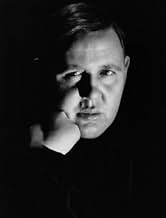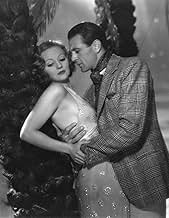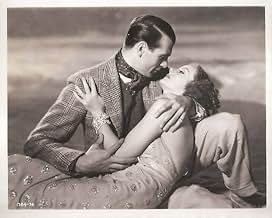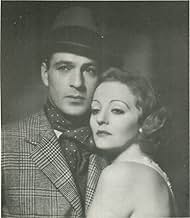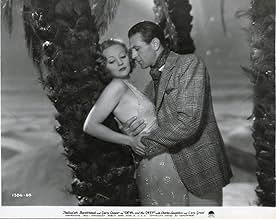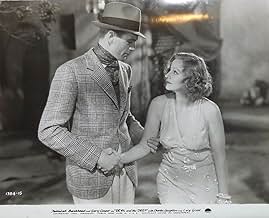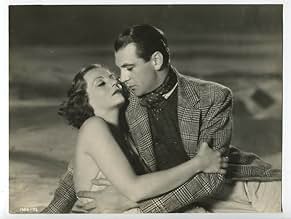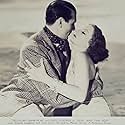- Awards
- 1 win total
James Dugan
- Condover
- (as Jimmie Dugan)
Peter Brocco
- Wireless Operator
- (uncredited)
Jack Gardner
- Submarine Crewman
- (uncredited)
John George
- Man in Crowd
- (uncredited)
Henry Guttman
- Submarine Crewman
- (uncredited)
Fred Kohler Jr.
- Submarine Crewman
- (uncredited)
Anderson Lawler
- Sailor
- (uncredited)
Lucien Littlefield
- Shopkeeper
- (uncredited)
- Director
- Writers
- All cast & crew
- Production, box office & more at IMDbPro
Featured reviews
Devil and the Deep contains a fascinating performance from Charles Laughton as a submarine commander going nuts with the conviction that his sultry wife (Tallulah Bankhead) is cheating on him first with Cary Grant and then Gary Cooper.
The physical production features a claustrophobic studio recreation of a North African town (reminiscent of Von Sternberg's "Morocco" but without the dazzling shadow play), a romantic scene in a starlit desert oasis (said to have been filmed in an actual desert but looking exactly like a painted backdrop) and finally the laughable spectacle of toy boats bobbing around in a tank of water that we're supposed to believe is the Mediterranean.
Bankhead, like other female stars of that historical moment, is made up and coiffed to look like a Garbo clone. The style suits her without overwhelming her innate, distinctive qualities of voice and manner. Laughton's performance prefigures his later Captain Bligh in Mutiny on the Bounty and Quasimodo in The Hunchback of Notre Dame. I prefer his work here to his Bligh, which was sometimes too messily overwrought. This is also the second 1932 film (the other being "Payment Deferred") in which he plays dementia with mad laughter. Cooper is wooden and awkward (and handsome) as usual and Grant does well in a smallish supporting role.
The physical production features a claustrophobic studio recreation of a North African town (reminiscent of Von Sternberg's "Morocco" but without the dazzling shadow play), a romantic scene in a starlit desert oasis (said to have been filmed in an actual desert but looking exactly like a painted backdrop) and finally the laughable spectacle of toy boats bobbing around in a tank of water that we're supposed to believe is the Mediterranean.
Bankhead, like other female stars of that historical moment, is made up and coiffed to look like a Garbo clone. The style suits her without overwhelming her innate, distinctive qualities of voice and manner. Laughton's performance prefigures his later Captain Bligh in Mutiny on the Bounty and Quasimodo in The Hunchback of Notre Dame. I prefer his work here to his Bligh, which was sometimes too messily overwrought. This is also the second 1932 film (the other being "Payment Deferred") in which he plays dementia with mad laughter. Cooper is wooden and awkward (and handsome) as usual and Grant does well in a smallish supporting role.
Cary Grant's charm and looks he displayed in his first movie, 1932's "This Is The Night," earned him a role in his next feature film, his second, as a potential love-interest to the wife of a naval ship commander in August 1932's "Devil and the Deep." Grant plays Lt. Jaeckel under the command of Charles Strum (Charles Laughton), a deeply flawed and extremely jealous husband to Diana Sturm (Talluhlah Bankhead). Based on Maurice Larrouy's novel, 'Sirenes et Tritons," Jaeckel sparks Strum's insane jealousy, which is unfounded by his wife's disinterest in the lieutenant. Jaeckel is quickly shipped out early in the film and is replaced by another lieutenant, Sempter (Gary Cooper), who it turns out gets kissy-wissy with Diana. Actress Bankhead said she accepted the role because she really wanted to get physically close to Cooper.
"Devil and the Deep" was Hollywood's first detailed look at the insides of a submarine. Once the U-Boat's commander Strum has his wife and her officer boyfriend Sempter underway in the underwater sub, he sets forth his plans to kill the lovers, taking along his crew for a suicidal maneuver. Laughton is clearly the star in the movie: the actor's menacing behavior fits the deranged Strum perfectly to a tee. The English-born and raised Laughton began acting on the stage in 1926 while dabbling in film during the late 1920s before securing his first major role in "Devil and the Deep." Tallulah Bankhead, primarily a stage actress, found acting in movies to be a complete bore. Her first two years in Hollywood, 1931 and 1932, were marked with her yearning to return to the live stage. "Devil and the Deep" was her second-to-last picture before reemerging on the screen twelve years later in Alfred Hitchcock's 1944 "Lifeboat."
"Devil and the Deep" marked the return to Hollywood for Gary Cooper. Burnt out and drained from an aggressive schedule of acting in ten movies within a two-year span, Cooper suffered from anemia and jaundice from his poor dietary habits. He decided to make a break from Los Angeles, feeling depressed and lonely. Reconnecting with an acquaintance, American heiress Dorothy Taylor, now a countess living in Rome, Italy, Cooper rehabilitated himself with her good food and great advice on nutrition. Developing a continental appreciation for the arts and customs of Europe, the actor's rough Western edges were smoothed out by the countess' patient tutorship. She took him on a ten-week big game safari hunting trip in Kenya, where he bagged a variety of trophy animals. His love of the wilderness kick in during the trip. In his role as the submarine's second-in-command, Cooper appears more comfortable and restrained in his role as the leader of the mutiny when it becomes obvious its commander is attempting to kill everyone on board.
"Devil and The Deep" is the only movie, besides a brief appearance in 1933's "Alice in Wonderland," Cooper and Grant ever shared credits in the same movie. This was a bit ironic since Grant had Cooper in mind when he selected his stage name Cary after the actor from Montana.
"Devil and the Deep" was Hollywood's first detailed look at the insides of a submarine. Once the U-Boat's commander Strum has his wife and her officer boyfriend Sempter underway in the underwater sub, he sets forth his plans to kill the lovers, taking along his crew for a suicidal maneuver. Laughton is clearly the star in the movie: the actor's menacing behavior fits the deranged Strum perfectly to a tee. The English-born and raised Laughton began acting on the stage in 1926 while dabbling in film during the late 1920s before securing his first major role in "Devil and the Deep." Tallulah Bankhead, primarily a stage actress, found acting in movies to be a complete bore. Her first two years in Hollywood, 1931 and 1932, were marked with her yearning to return to the live stage. "Devil and the Deep" was her second-to-last picture before reemerging on the screen twelve years later in Alfred Hitchcock's 1944 "Lifeboat."
"Devil and the Deep" marked the return to Hollywood for Gary Cooper. Burnt out and drained from an aggressive schedule of acting in ten movies within a two-year span, Cooper suffered from anemia and jaundice from his poor dietary habits. He decided to make a break from Los Angeles, feeling depressed and lonely. Reconnecting with an acquaintance, American heiress Dorothy Taylor, now a countess living in Rome, Italy, Cooper rehabilitated himself with her good food and great advice on nutrition. Developing a continental appreciation for the arts and customs of Europe, the actor's rough Western edges were smoothed out by the countess' patient tutorship. She took him on a ten-week big game safari hunting trip in Kenya, where he bagged a variety of trophy animals. His love of the wilderness kick in during the trip. In his role as the submarine's second-in-command, Cooper appears more comfortable and restrained in his role as the leader of the mutiny when it becomes obvious its commander is attempting to kill everyone on board.
"Devil and The Deep" is the only movie, besides a brief appearance in 1933's "Alice in Wonderland," Cooper and Grant ever shared credits in the same movie. This was a bit ironic since Grant had Cooper in mind when he selected his stage name Cary after the actor from Montana.
Devil and the Deep (1932)
*** (out of 4)
Diana Sturm (Tallulah Bankhead) is married to submarine Cmdr. Charles Sturm (Charles Laughton) and everyone sees her as a bad person. The truth of the matter is that Charles is extremely abusive to her and will stop at nothing to destroy any man's life he feels she is attracted to. One night while running away from the abuse, Diana meets Lt. Sempter (Gary Cooper) and the two have a relationship, which soon leads to disaster.
DEVIL AND THE DEEP isn't a very well-known movie and I must admit that I'm quite shocked about that. I had never really heard of the film until recently and it's rather amazing because you've got not only Bankhead, Laughton and Cooper but you've also got a young Cary Grant in a nice early role. Four legendary stars from Hollywood's Golden Age and you mention the title to most film buffs and they won't be familiar with it.
Whatever the reason people don't know the film, it's really too bad because it's actually pretty good. The greatest thing about the film is the ending, which I won't spoil but it takes place on the submarine and there's no question that it's quite tense and rather claustrophobic. Director Marion Gering really does a nice job with this entire sequence and while some of the special effects shots aren't the greatest, the overall impact of the scene is very good. The film does get off to a rather slow start but it quickly picks up.
The performances are certainly the main reason to watch the picture with Bankhead delivering a fine one. She's very good in the role of the abusive wife and I really enjoyed her performance when she had to show the fear she feels for her husband. I thought the actress was very believable as an abused woman. Cooper was also very stoic in his "hero" type of role. I thought the two of them shared some very good chemistry and that helped their relationship. Grant appears early on in the picture and he's very good as well. As for Laughton, he gets a very special screen credit and he certainly deserves it as he is great as the crazed man who will stop at nothing to hurt his wife and any man who likes her. By watching this film it's easy to see why he would eventually be cast in MUTINY ON THE BOUNTY.
At just seventy-five minutes the film has a very good pace and there's no question that it's one worth watching.
*** (out of 4)
Diana Sturm (Tallulah Bankhead) is married to submarine Cmdr. Charles Sturm (Charles Laughton) and everyone sees her as a bad person. The truth of the matter is that Charles is extremely abusive to her and will stop at nothing to destroy any man's life he feels she is attracted to. One night while running away from the abuse, Diana meets Lt. Sempter (Gary Cooper) and the two have a relationship, which soon leads to disaster.
DEVIL AND THE DEEP isn't a very well-known movie and I must admit that I'm quite shocked about that. I had never really heard of the film until recently and it's rather amazing because you've got not only Bankhead, Laughton and Cooper but you've also got a young Cary Grant in a nice early role. Four legendary stars from Hollywood's Golden Age and you mention the title to most film buffs and they won't be familiar with it.
Whatever the reason people don't know the film, it's really too bad because it's actually pretty good. The greatest thing about the film is the ending, which I won't spoil but it takes place on the submarine and there's no question that it's quite tense and rather claustrophobic. Director Marion Gering really does a nice job with this entire sequence and while some of the special effects shots aren't the greatest, the overall impact of the scene is very good. The film does get off to a rather slow start but it quickly picks up.
The performances are certainly the main reason to watch the picture with Bankhead delivering a fine one. She's very good in the role of the abusive wife and I really enjoyed her performance when she had to show the fear she feels for her husband. I thought the actress was very believable as an abused woman. Cooper was also very stoic in his "hero" type of role. I thought the two of them shared some very good chemistry and that helped their relationship. Grant appears early on in the picture and he's very good as well. As for Laughton, he gets a very special screen credit and he certainly deserves it as he is great as the crazed man who will stop at nothing to hurt his wife and any man who likes her. By watching this film it's easy to see why he would eventually be cast in MUTINY ON THE BOUNTY.
At just seventy-five minutes the film has a very good pace and there's no question that it's one worth watching.
Bankhead made a handful of silent films before she became the rage of the London stage in the late 20s. Back in Hollywood, she made 7 films in 1931 and 1932. The Devil and the Deep was the penultimate one. She was not a success. It would be more than a decade before she would "face the cameras" again in 1944's brilliant Lifeboat for Alfred HItchcock.
The few of these early talkies I've seen have been fascinating because Bankhead was a STAR, and no one was quite like her. She had the allure of Garbo or Dietrich, but she was closer to Davis or Crawford or Constance Bennett in her temperament. In Faithless, Tarnished Lady, The Cheat, and Devil and the Deep she plays basically the same character: the woman who goes wrong but is saved in the end. Bankhead suffered in her 30s films from lousy directors. In Devil and the Deep, Marion Gering mis-directs by letting Charles Laughton ham it up as the husband, while Gary Cooper as the lover is boring. Bankhead holds center stage and is really very good in this VERY strange film.
It's a submarine movie set apparently in Algiers or some such place. She is the commander's bored wife. He's nuts. After her fling with Cary Grant (yes it's quite the cast), Laughton has him transferred. Cooper's fate is worse since they're all aboard the sub when all hell breaks loose.
Bankhead looks great in stylish clothing and slinks about the house and the club , the streets (amid whirling dervishes), and on the sub. Laughton is menacing and his final scene is memorable. But they're not a very believable couple. Cooper is oddly boring and is given awful lines to say. Grant, in a small part, is, well, Cary Grant. Paul Porcasi is the shop keeper, Henry Kolker and Juliette Compton are the catty club denizens. One problem is that the film is underlit so it's hard to see a lot of detail. Amusing scenes with Cooper and Bankhead staring up at the stars, buying cheap perfume, and buying a pool cue.
With a better director and better writers, this could have been a blockbuster. But it's neat to see Bankhead in her prime, before she became a campy professional star.
The few of these early talkies I've seen have been fascinating because Bankhead was a STAR, and no one was quite like her. She had the allure of Garbo or Dietrich, but she was closer to Davis or Crawford or Constance Bennett in her temperament. In Faithless, Tarnished Lady, The Cheat, and Devil and the Deep she plays basically the same character: the woman who goes wrong but is saved in the end. Bankhead suffered in her 30s films from lousy directors. In Devil and the Deep, Marion Gering mis-directs by letting Charles Laughton ham it up as the husband, while Gary Cooper as the lover is boring. Bankhead holds center stage and is really very good in this VERY strange film.
It's a submarine movie set apparently in Algiers or some such place. She is the commander's bored wife. He's nuts. After her fling with Cary Grant (yes it's quite the cast), Laughton has him transferred. Cooper's fate is worse since they're all aboard the sub when all hell breaks loose.
Bankhead looks great in stylish clothing and slinks about the house and the club , the streets (amid whirling dervishes), and on the sub. Laughton is menacing and his final scene is memorable. But they're not a very believable couple. Cooper is oddly boring and is given awful lines to say. Grant, in a small part, is, well, Cary Grant. Paul Porcasi is the shop keeper, Henry Kolker and Juliette Compton are the catty club denizens. One problem is that the film is underlit so it's hard to see a lot of detail. Amusing scenes with Cooper and Bankhead staring up at the stars, buying cheap perfume, and buying a pool cue.
With a better director and better writers, this could have been a blockbuster. But it's neat to see Bankhead in her prime, before she became a campy professional star.
Paramount, at the height of its sophistication in the early 30's, could recycle its sets from MOROCCO and fashion a stylish production out of a passable triangle melodrama. Unfulfilled wife Tallulah Bankhead --frustrated at home, humiliated in front of her social set by her pathologically jealous husband -- stumbles into an Arab marketplace crowded with whirling dervishes, and into the arms of Gary Cooper for a romantic liaison under the desert stars. Conflicts ensue, of course, and then all three find themselves on a crippled submarine.
Viewers who know Tallulah Bankhead only from her caricatured role in LIFEBOAT will be startled by her intensity and bruised glamour: slouching in Travis Banton gowns, she looks sometimes like Garbo, sometimes like "Margo Channing". Meanwhile, she gives a crash course in how to hold a melodrama together, commanding every scene, inflecting every line with subtle nuances. When she must deal with menacing Charles Laughton, the air between them vibrates with tension. Laughton [billed as "the eminent English character actor"] does his share as well, but he seems mannered in a familiar way, a dry run for his Captain Bligh.
Only the radiant young Cary Grant in a dazzling naval uniform steals attention from the leading lady in a brief appearance. Gary Cooper, though persuasive as the romantic hero, soon gets submerged in a disappointingly shallow character.
The eye is seduced by cameraman Charles Lang's repertoire of shadows, the heart is stirred by a star performance, but in the end the head may resist: the terse dialogue tries for Hemingway but remains stubbornly pedestrian and remarkably humorless: the script owes its sole laugh to Bankhead's line reading while buying a billiard cue. The devil is in the dialogue!
Viewers who know Tallulah Bankhead only from her caricatured role in LIFEBOAT will be startled by her intensity and bruised glamour: slouching in Travis Banton gowns, she looks sometimes like Garbo, sometimes like "Margo Channing". Meanwhile, she gives a crash course in how to hold a melodrama together, commanding every scene, inflecting every line with subtle nuances. When she must deal with menacing Charles Laughton, the air between them vibrates with tension. Laughton [billed as "the eminent English character actor"] does his share as well, but he seems mannered in a familiar way, a dry run for his Captain Bligh.
Only the radiant young Cary Grant in a dazzling naval uniform steals attention from the leading lady in a brief appearance. Gary Cooper, though persuasive as the romantic hero, soon gets submerged in a disappointingly shallow character.
The eye is seduced by cameraman Charles Lang's repertoire of shadows, the heart is stirred by a star performance, but in the end the head may resist: the terse dialogue tries for Hemingway but remains stubbornly pedestrian and remarkably humorless: the script owes its sole laugh to Bankhead's line reading while buying a billiard cue. The devil is in the dialogue!
Did you know
- TriviaIn 1932, Tallulah Bankhead told an interviewer that she only accepted this role so that she could "f*ck Gary Cooper."
- Quotes
Cmdr. Charles Sturm: [to Lt Sempter] It must be a happy thing to look like you do. I suppose women love you. I've never had that. Must be a happy thing.
- Crazy creditsAnd introducing CHARLES LAUGHTON The eminent English character actor in the role of THE COMMANDER
- ConnectionsFeatured in MsMojo: Top 10 Biggest Old Hollywood Scandals (2023)
- How long is Devil and the Deep?Powered by Alexa
Details
- Runtime1 hour 18 minutes
- Color
- Aspect ratio
- 1.37 : 1
Contribute to this page
Suggest an edit or add missing content

Top Gap
By what name was Le Démon du sous-marin (1932) officially released in India in English?
Answer
